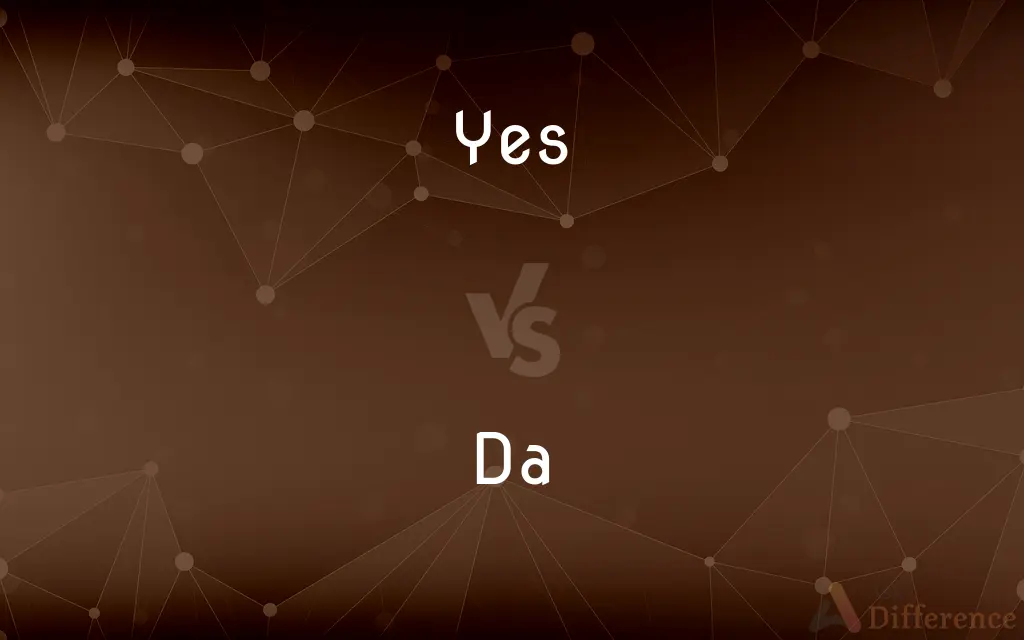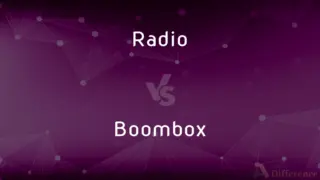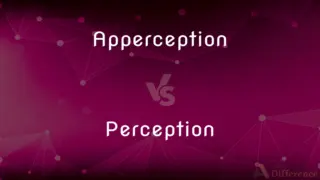Yes vs. Da — What's the Difference?
Edited by Tayyaba Rehman — By Urooj Arif — Updated on April 5, 2024
"Yes" is an affirmative response in English, used to express agreement or affirmation, while "Da" serves the same purpose in several Slavic languages, including Russian.

Difference Between Yes and Da
Table of Contents
ADVERTISEMENT
Key Differences
"Yes" is a fundamental part of English vocabulary, indicating agreement, acceptance, or the truthfulness of a statement. It's used in a wide range of contexts, from casual conversations to formal settings. "Da," on the other hand, holds the same affirmative meaning in languages like Russian, Serbian, and Bulgarian. It's similarly versatile, used in both informal and formal communication.
In terms of pronunciation and spelling, "yes" is monosyllabic with a clear, straightforward pronunciation in English. In contrast, "da" may sound different across the Slavic languages due to slight variations in pronunciation, despite its consistent spelling.
Culturally, the use of "yes" in English-speaking contexts often requires elaboration or a follow-up to clarify the agreement or affirmation, especially in professional or detailed discussions. Whereas in Slavic cultures, "da" can be equally nuanced, but the expectation for immediate elaboration might vary depending on the conversation's context and familiarity between speakers.
English speakers learning Slavic languages might find the usage of "da" relatively simple due to its direct correlation with "yes." However, understanding the nuances of its use requires cultural and linguistic immersion. Conversely, speakers of Slavic languages often learn "yes" as one of the first words in English, given its fundamental role in basic communication.
Despite their similarities in function, "yes" and "da" are embedded in distinct linguistic structures and cultures, making their use and interpretation subject to the rules and nuances of their respective languages.
ADVERTISEMENT
Comparison Chart
Language
English
Russian, Serbian, Bulgarian, etc.
Meaning
Affirmative response
Affirmative response
Use Context
Both formal and informal
Both formal and informal
Pronunciation
/jɛs/
Varies in Slavic languages
Cultural Nuance
Often requires follow-up
Follow-up expectations vary
Compare with Definitions
Yes
Affirmation of a statement.
Do you understand? Yes.
Da
Affirmation in Russian.
Ты понимаешь? Да. (Do you understand? Yes.)
Yes
Agreement to a request.
Can you help me? Yes, I can.
Da
Agreement to a proposal in Serbian.
Možeš li mi pomoći? Da. (Can you help me? Yes.)
Yes
Confirmation of a fact.
Is this yours? Yes, it is.
Da
Positive response in Bulgarian.
Гласуваме 'да'? (Are we voting 'yes'?)
Yes
Expression of enthusiasm.
Are you excited? Yes!
Da
Confirmation in Croatian.
Je li to tvoje? Da. (Is this yours? Yes.)
Yes
Positive response in voting.
All in favor, say 'yes.'
Da
Expression of agreement in Slovenian.
Si navdušen? Da. (Are you excited? Yes.)
Yes
Used to give an affirmative response
‘Do you understand?’ ‘Yes.’
Da
A ducktail.
Yes
Used as a response to someone addressing one or trying to attract one's attention
‘Oh, Mr Lawrence.’ ‘Yes?’
Da
Father.
Yes
Used to question a remark
‘It should be easy to check.’ ‘Oh yes? How?’
Da
Yes; an affirmative response.
Yes
Encouraging someone to continue speaking
‘When you bought those photographs …’ ‘Yes?’
Da
Yes.
Yes
Expressing great pleasure or excitement
Plenty to eat, including hot hamburger sandwiches (yes!)
Da
An official prosecutor for a judicial district
Yes
Expressing irritation or impatience
‘Is the pain still there?’ ‘Yes, yes, damn you, the pain is always there’
Yes
An affirmative answer or decision, especially in voting
Answering with assured and ardent yeses
Yes
It is so; as you say or ask. Used to express affirmation, agreement, positive confirmation, or consent.
Yes
An affirmative or consenting reply.
Yes
An affirmative vote or voter.
Yes
To give an affirmative reply to.
Yes
Used to express great satisfaction, approval, or happiness.
Yes
(interrogative) Used to ask for more information with a request.
I need some help.
Yes?
Yes?
Yes
An affirmative expression; an answer that shows agreement or acceptance.
Was that a yes?
Yes
A vote of support or in favor/favour of something.
The workers voted on whether to strike, and there were thirty "yeses" and one "no".
Yes
To agree with, affirm, approve.
Did he yes the veto?
Yes
(slang) to attempt to flatter someone by habitually agreeing
Yes
Ay; yea; - a word which expresses affirmation or consent; - opposed to no.
Yes
An affirmative;
I was hoping for a yes
Common Curiosities
Is "da" used the same way across all Slavic languages?
While "da" generally means "yes" across Slavic languages, nuances and usage can vary by region and dialect.
What does "yes" mean?
"Yes" is an affirmative response in English.
What does "da" mean?
"Da" means "yes" in several Slavic languages.
How do non-native speakers learn the nuances of "yes" and "da"?
Through practice, immersion, and understanding cultural contexts.
Are "yes" and "da" interchangeable?
They are interchangeable only within the context of language translation, not within a single language.
How do cultural differences influence the use of "yes" and "da"?
Cultural nuances can affect how and when affirmatives are used, potentially requiring additional context for clarity.
Can "yes" be used in any context in English?
"Yes" is versatile and can be used in both formal and informal contexts.
How important is context when using "yes" or "da"?
Context is crucial, as it can determine the need for further explanation or clarification in both languages.
Are there idiomatic uses for "yes" and "da"?
"Yes" and "da" can be part of idiomatic expressions, but their primary function remains affirmative.
Can learning "yes" and "da" help in language acquisition?
Understanding these basic affirmatives is a foundational step in learning English or Slavic languages.
Do "yes" and "da" have the same pronunciation?
No, "yes" is pronounced /jɛs/ in English, while "da" varies in pronunciation across Slavic languages.
Is it common for "yes" and "da" to be among the first words learned in a new language?
Yes, as they are fundamental to basic communication.
Can "yes" and "da" be used in legal contexts?
Yes, both can be used for affirmative responses in legal settings, but clarity and precision are often required.
Are there negative forms of "yes" and "da"?
English uses "no," and Slavic languages have their own equivalents, such as "нет" (net) in Russian.
What role do "yes" and "da" play in social interactions?
They facilitate agreement, confirmation, and positive interaction in both English and Slavic-speaking societies.
Share Your Discovery

Previous Comparison
Radio vs. Boombox
Next Comparison
Apperception vs. PerceptionAuthor Spotlight
Written by
Urooj ArifUrooj is a skilled content writer at Ask Difference, known for her exceptional ability to simplify complex topics into engaging and informative content. With a passion for research and a flair for clear, concise writing, she consistently delivers articles that resonate with our diverse audience.
Edited by
Tayyaba RehmanTayyaba Rehman is a distinguished writer, currently serving as a primary contributor to askdifference.com. As a researcher in semantics and etymology, Tayyaba's passion for the complexity of languages and their distinctions has found a perfect home on the platform. Tayyaba delves into the intricacies of language, distinguishing between commonly confused words and phrases, thereby providing clarity for readers worldwide.















































